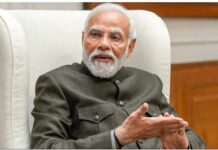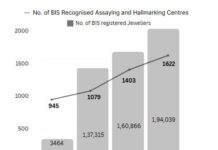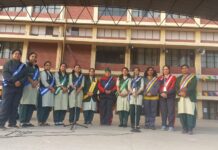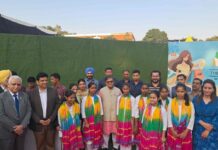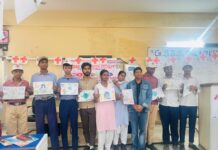Delegates of 20 countries learning public health management and leadership through gamification
PGIMER teaching public health management and leadership through gamification
We will replicate PGIMER good practices in public health in our countries- said international participants from 20 countries
The senior officials of 20 countries are learning public health management and leadership through gamification, a technique of playing games or adding game-like elements like points and reward system to enhance learning and improve productivity. This unique technique help participants of different countries to imbibe important technical skills through games and fun-exercises while eliminating the linguistic and cultural barriers. The gamification technique introduced in this program since its inception in year 2016 has enhanced participation and engagement of multi-country participants, motivates them and build stronger cohesive networks among participants of developing nations which will help in strengthening the aim of Indian Technical Economic Cooperation and ancient Indian philosophy “Vasudeva Kutumbakam,” i.e. World is One family, Dr Sonu Goel, Professor of Community Medicine and School of Public Health, PGIMER Chandigarh and Program Director of current International Public Health Management Development Program (IPHMDP).
Under this 10 days flagship programme in public health of Ministry of External Affairs, Government of India, organised from February 21 to March 2, 2023 by Department of Community Medicine and School of Public Health at PGIMER in Chandigarh there is participation of 37 senior-level participants from 20 countries of Asia, Africa, East Europe, Latin America, the Caribbean, and Small Island countries including Syria, Kingdom of Eswatini, Tanzania, Nigeria, Ethiopia, Paraguay, Nepal, Kazakhstan, Botswana, Tajikistan, Oman, Mexico, Liberia, Zambia, Bhutan, South Sudan, Iraq, Mongolia, and Mauritius.
We have introduced many games and game like techniques like building tower (for team building), rope and blind fold (for communication), Do-the-opposite (for change management), rings and straw (coordination and teamwork), ad-mad (for advocacy, effective communication and public health marketing) laughter yoga (for stress management) role plays for importance of informal communication, undertaking advocacy and team work; besides familiarizing on scoring system, provide informal rewards to winners, feedback through interesting coloured boards, making team leaders for different days, best dressed and best participatory participant for the days, allocating different tasks and responsibilities to all participants throughout the course (for empowerment, motivation and team work) and many more. It is a unique way to assess the program’s learnings and the unconventional thinking, Dr Goel said.
The delegates said that program that will assist them in acquiring efficient management and leadership skills for the benefit of their nations. Additionally, the initiative will foster collaborations between nations and institutions for jointly achieving Sustainable Development Goals (SDGs), said the delegates collectively during a press meet organised by PGIMER Chandigarh.
Through this flagship programme of the Indian Technical Economic Cooperation (ITEC), Ministry of External Affairs, Government of India, more than 1000 senior delegates from 85 nations have already improved their skills over the past six years, starting in the year 2016, said Dr Kritika Upadhyay, Program Coordinator. The entire course is taught using a variety of formal and informal teaching methods, including role plays, group discussions, critical analysis, problem-solving exercises, case studies, quizzes, videos, management games, and interview sessions. They are also introduced to public health management using the ancient knowledge of the Indian subcontinent, she said.
We learnt from a 3 day study trip to Shimla to the Indira Gandhi Medical College where we were introduced to State-of-Art practices in clinical care, said Erica, Medical Specialist from Mexico. Another delegate Apurba, Deputy Superintendent of Police and medical Doctor from Nepal said that best practices in TB control program, Digital Surveillance and management of NCDs and intra-dermal vaccination for rabies in Himachal Pradesh shown during field visit in State Institute Health and Family Welfare Training, Shimla will be useful for their country.
The participants appreciated cutting-edge patient care services, such as tele-evidence, telemedicine, and the ROTTO facility for organ donation of PGIMER and said that they will request their country and institutions to adopt such good practices. A doctor from Nigeria Dr David told that they are facing scarcity of doctors in their country and tele-medicine and tele-evidence will help their country to overcome such shortages.
After the programme, the participants will create an Action Plan for their nation or institution based on what they learned, and three months after the programme ends, they will submit an Action Plan Implementation Report. The Indian Ministry of External Affairs will honour the best country report.




